Is the Honeymoon Over for Ukrainian President Volodymyr Zelensky?
A sweeping power grab, mass youth protests, and growing unease in western capitals - has Ukraine's wartime president lost the trust that once shielded him?
Commentary
President Volodymyr Zelensky signs a power grab into law — and the backlash has begun.
By signing into law the bill that guts the independence of Ukraine’s top anti-corruption bodies, President Zelensky has done something extraordinary — and not in a good way. In one stroke, his administration has undercut its own reformist legacy, alienated key Western partners, and ignited the largest protests in Ukraine since Russia’s full-scale invasion began.
The new law places the National Anti-Corruption Bureau (NABU) and the Special Anti-Corruption Prosecutor’s Office (SAPO) — both born of the Euromaidan revolution — under the de facto control of the president’s office. For many, it’s a clear attempt to consolidate power and neutralize the very watchdogs designed to keep the executive in check.
Brussels is alarmed. So is civil society.
The reaction from Ukraine’s Western allies has been swift and serious. EU officials and G7 ambassadors have warned that the move could delay — or derail — Ukraine’s EU accession bid and jeopardize billions in aid tied to reform benchmarks. Even before the ink dried, criticism echoed across Brussels, Berlin, and elsewhere.
But perhaps more tellingly, the Ukrainian people have spoken.
Last night, thousands — mostly young people — flooded streets across the country in spontaneous, peaceful protest. It was a show of resistance not seen since February 2022. And it sent a powerful message: the unwritten social contract that kept civil society largely on the sidelines — support the war effort, trust the government, stay quiet for now — has been broken. The message from Bankova was loud and clear. So was the reply from the streets: Ганьба — shame.
A gift to the Kremlin — and to Washington’s far right
This moment will be seen in Moscow as a propaganda gift. Putin’s regime has long argued that Ukraine is just as corrupt as Russia — only with better PR. Now, it can point to real evidence that one of the last bastions of independence and transparency has been kneecapped.
But it’s not just the Kremlin that’s cheering.
In Washington, MAGA Republicans like Marjorie Taylor Greene (R-Ga)— who have long opposed further aid to Ukraine — will seize on this as validation. Why fund democracy abroad, they’ll argue, if Ukraine is backsliding into the very dysfunction it vowed to leave behind?
What happens next?
The question now must be asked: what comes next? Will journalists who probe too deeply into the alleged misdeeds of those in Zelensky’s inner circle be targeted next?
It’s not an idle concern. We’ve already seen how little regard the president — and his handpicked, fiercely loyal new prime minister, Yulia Svyrydenko — have for a free, independent, and inquisitive media. Just last month at the Ukraine Recovery Conference in Rome, the issue of rebuilding the country’s ailing media sector was deliberately left off the agenda — despite appeals from more than 40 media organizations, including Reporters Without Borders.
In a democratic Ukraine, investigative journalism must not be treated as a nuisance. It is a cornerstone of reform — and a vital check on power, especially during wartime.
Reform or relapse?
Some defenders of the law insist it’s a wartime necessity — a tool to investigate missing persons and speed up bureaucracy. But that explanation rings hollow, especially coming just days after NABU opened a case into a powerful Zelensky ally, and the SBU raided its offices without warrants.
This isn’t reform. It’s regression.
Zelensky was elected on a promise of change — and rewarded with an extraordinary level of trust. That trust is now fraying. The war is no excuse for dismantling the very institutions meant to uphold democracy and integrity. Especially not now, when Ukraine needs all the goodwill — and funding — it can get.
The world is watching. Ukrainians are watching. And they will not accept a return to the old ways.
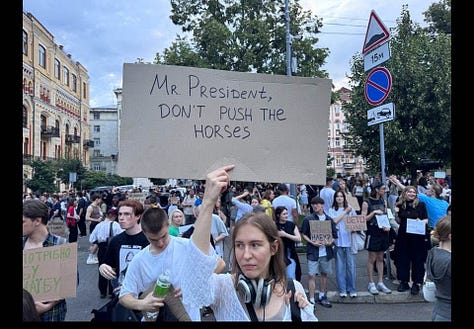
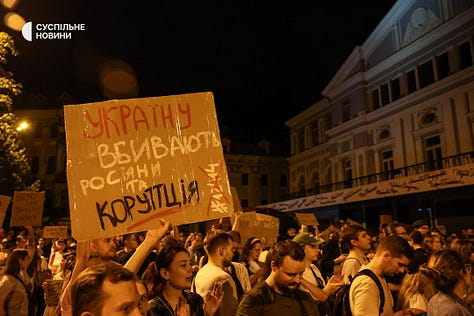
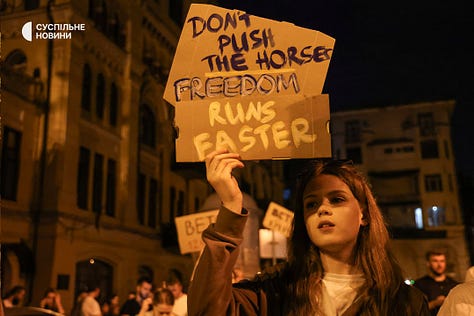
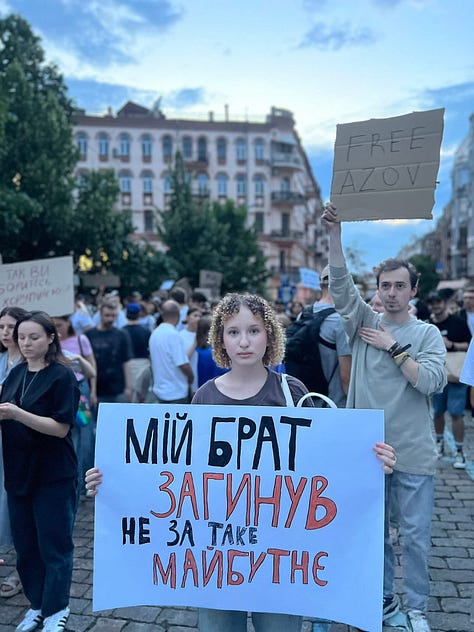
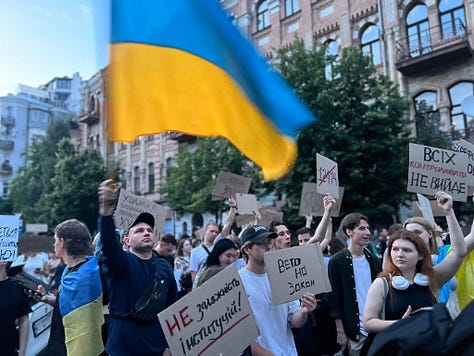
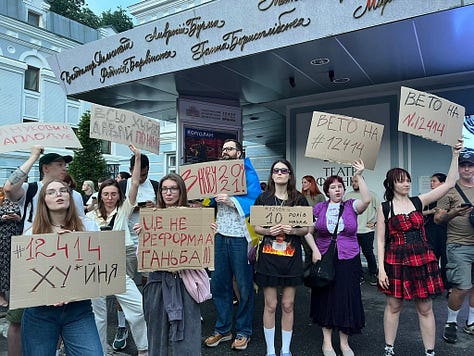
If you value sharp, independent geopolitical analysis — especially from voices on the ground — consider becoming a paid subscriber to World Briefing. It helps keep this work going, free from corporate or political influence.
European Commission president Ursula von der Leyen asked Ukrainian president Volodymyr Zelenskyy for explanations on the controversial reform weakening the country’s anti-corruption agencies, her spokesperson said. Von der Leyen “conveyed her strong concerns about the consequences of the amendments,”her spokesperson said, adding that she requested “explanations” about the change. The EU is “very concerned” about the adoption of the new law, which it said “risks weakening strongly the competences and powers of anti-corruption institutions of Ukraine.” They added: “The respect for the rule of law and the fight against corruption are core elements of the European Union. As a candidate country, Ukraine is expected to uphold these standards fully. There cannot be a compromise.” Meanwhile, Germany, a strong backer of Ukraine, said it expects Kyiv to continue battling corruption. Foreign minister Johann Wadephul said in a social media post that he expected “Ukraine to continue with determination its efforts in combating corruption.” He that the restriction of the anti-corruption agencies’ independence could be an issue forUkraine’s path to join the EU.
Volodymyr Zelensky says he’s met with anti-corruption and security officials pledging to draw up a plan to fight corruption within the next two weeks as he seeks to address the public frustration with the rushed reform in this area. In a post on Telegram, he said: “A very necessary meeting, a frank and useful conversation that really helps. We all have a common enemy – the Russian occupiers, and the protection of the Ukrainian state presupposes sufficient strength of the law enforcement and anti-corruption systems, and therefore – a real sense of justice.” Responding to last night’s protests, he said: “We all hear what society says. We see what people expect from state institutions to ensure justice and the efficiency of each institution. We discussed the necessary administrative and legislative decisions that will allow us to strengthen the work of each institution, resolve existing contradictions, and eliminate threats. Everyone will work together, and we will support them at the political level.” The group will present a detailed plan on “what steps are needed and will be implemented to strengthen Ukraine and eliminate existing issues, provide more justice, and truly protect the interests of Ukrainian society” within the next two weeks, he added - Guardian
Even for Ukrainian soldiers locked in brutal warfare hundreds of kilometers from the capital, Zelensky’s move to dismantle the country’s anti-corruption infrastructure built over the past decade felt like a blow. “I think (Zelensky’s) government has just shown its true face once again, which we have seen since 2019,” a 32-year-old drone operator, who goes by the callsign “Architect,” told the Kyiv Independent. “It’s just that the war has shifted our focus.” Petro Kuzyk, a battalion commander with the National Guard of Ukraine, believes that democracy in Ukraine is now being fought for by Ukrainian infantrymen, who are holding onto their positions despite the ammunition shortage, rather than the government officials who he believes want “to score political points for themselves.” Condemning the swift move as “a fatal mistake of the authorities,” Kuzyk said he worries that abolishing the independence of the anti-corruption institutions could give the government additional opportunities to repress undesirable opposition. “The most disgusting thing is that, against the background of a large number of corruption scandals involving government representatives, this looks like an attempt, very primitive, to settle and legalize the assets that they stole from the Ukrainian people,” Kuzyk told the Kyiv Independent.
Speaking of drones, a new Russian decoy drone used to spoof Ukrainian air defences is made up entirely of Chinese parts, it has been revealed. The discovery, by Ukrainian intelligence, marks the first time that Russia has deployed weapons made only with Chinese components. It shows the latest sign of cooperation between Beijing and Moscow, despite Xi Jinping insisting that China does not supply lethal aid to either side of the war in Ukraine. While Chinese technology has been found in other Russian weapons, it had always been combined with components from other countries. Ukrainian intelligence said it was able to recover two of the new unmanned aerial vehicles (UAVs) and take them apart. The UAV CBTS.611000 drone is primarily used for reconnaissance and as a decoy, but it can also carry a warhead weighing up to 15kg - Telegraph
The UN's Palestinian refugee agency (UNRWA) has warned there are one million children in the region who are at risk of severe malnutrition, with the Hamas-run health ministry saying 111 people have died due to starvation since the start of the war. It comes as more than 100 NGOs said only 28 lorries' worth of aid is being distributed each day on average - the situation has led to exorbitant prices for basic food products. "Palestinians are trapped in a cycle of hope and heartbreak, waiting for assistance and ceasefires, only to wake up to worsening conditions," the statement says. The Israeli government has said hundreds of trucks are poised at the border waiting for collection but the UN said it's struggling to get commitments that Palestinians will not be killed while trying to access. Meanwhile the hostilities have continued after the recent escalation - with the Hamas-run health ministry reporting 113 deaths in the last 24 hours - BBC
A landmark decision by a top UN court has cleared the way for countries to sue each other over climate change, including over historic emissions of planet-warming gases. But the judge at the International Court of Justice in the Hague, Netherlands on Wednesday said that untangling who caused which part of climate change could be difficult. The ruling is non-binding but legal experts say it could have wide-ranging consequences. It will be seen as a victory for countries that are very vulnerable to climate change, who came to court after feeling frustrated about lack of global progress in tackling the problem. "Tonight I'll sleep easier. The ICJ has recognised what we have lived through - our suffering, our resilience and our right to our future," said Flora Vano, from the Pacific Island Vanuatu, which is considered the country most vulnerable to extreme weather globally. "This is a victory not just for us but for every frontline community fighting to be heard." - BBC
Russian lawmakers have introduced a bill that would make Russia’s mandatory military conscription — not to be confused with wartime mobilization — a year-round process. To implement this, they propose amending two federal laws. Currently, conscription in Russia takes place twice a year: once in the spring and once in the fall. It appears the goal is to increase the processing capacity of military enlistment offices. In theory, they would be able to spend half the year conducting medical exams for conscripts and the other half on sending people off to military service. The specifics will become clearer once the regulations on conscription are amended — and the government will introduce those changes only after the bill is passed this fall. The lawmakers also cite a “directive” from Vladimir Putin dated June 6, 2025, No. Pr-1271. However, that order hasn’t been published. In an explanatory note, lawmakers suggested their amendments would help “distribute the workload more evenly across enlistment offices and improve the quality of military conscription.” The bill’s sponsors are aiming for January 1, 2026. But first, it must pass through the State Duma and win approval from the Federation Council. After that, the president would still need to sign it and the law must be officially published. The new conscription rules would apply to all men in Russia between the ages of 18 and 30 - Meduza
Explainer
The United States maintains a considerable military presence in the Middle East, with forces in more than a dozen countries and on ships throughout the region’s waters. That presence expanded in 2024 as the United States focused on deterring and defeating threats from Iran and its network of armed affiliates in the region, including Hamas (Gaza Strip), Hezbollah (Lebanon), the Houthis (Yemen), and several Iraq- and Syria-based militant groups - CFR
On July 3, Qatar hired another big name in Washington: Bill Bennett, the former secretary of education under President Ronald Reagan. A filing shows that Bennett now has the title Senior Education Adviser to the Embassy of Qatar, for which he will be paid $30,000 a month for seven months. “In turn,” the filing said, “Dr. Bennett will make efforts to publicize the fact that Qatari higher education efforts do not support radical Islamicist [sic] movements or positions, and his engaging in publicized efforts—potentially including communications to U.S. political office holders—would help dispel contrary notions.” Bennett might also testify in front of Congress and “make himself available for TV, radio, or internet streamed interview” to promote Qatar’s image and investments, according to the filing. Last year, Fox News’ website published an op-ed by Bennett with the headline “An American Education Partnership in Qatar Brings Surprising Benefits to the Middle East.” The article was published just four days after Bennett spoke on the phone with Andrew King, a lobbyist for Qatar. In the 1990s, Bennett was widely known as the author of The Book of Virtues, stories and teachings aimed at helping children develop “good character.” Bennett couldn’t be reached for comment - The Free Press
A Spanish beach at a popular holiday hotspot was cleared this week after a tourist was attacked by an unidentified marine creature. A red flag was lifted on Tuesday morning (July 22) at Playa de Palma, the main beach in Majorca's capital, after a woman sustained a "severe bite" to her leg. The holidaymaker, reportedly an 85-year-old Italian national, emerged from the water with "part of her calf torn off", according to the Majorca Daily Bulletin. Lifeguards took the decision to clear the coastline to conduct a hunt for the animal, though the beach reopened roughly an hour later when no creature was discovered. Consequently, the species behind the attack remains unknown, but marine specialists have offered their theories on the most probable culprit, reports Chronicle Live. Fisheries Director General Toni Grau suggested to the Majorca Daily Bulletin that a triggerfish might have been responsible - a species inhabiting warm waters globally and notorious for aggressive territorial instincts - Mirror



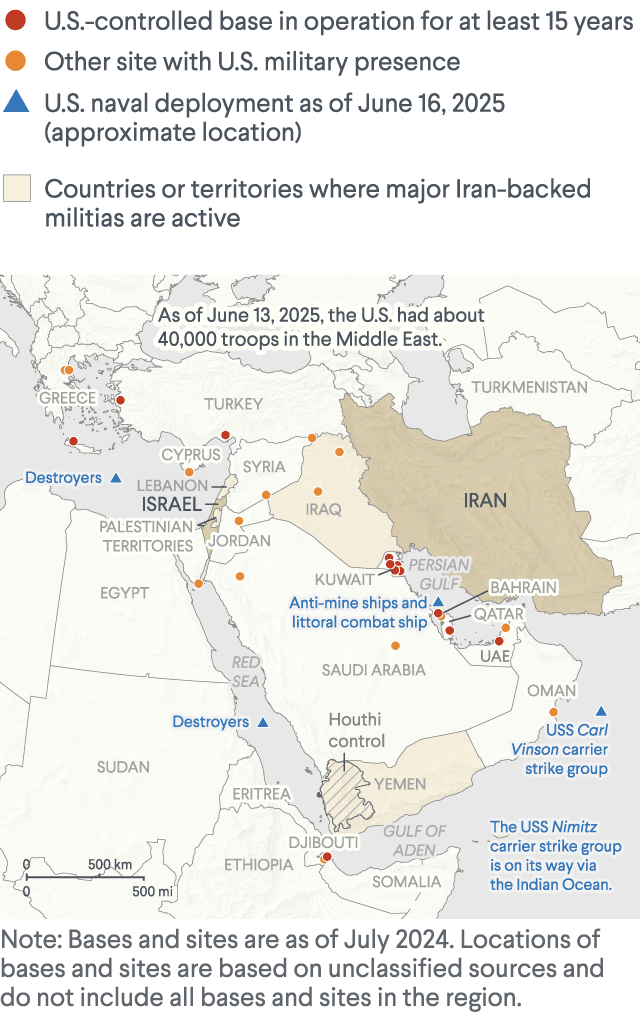

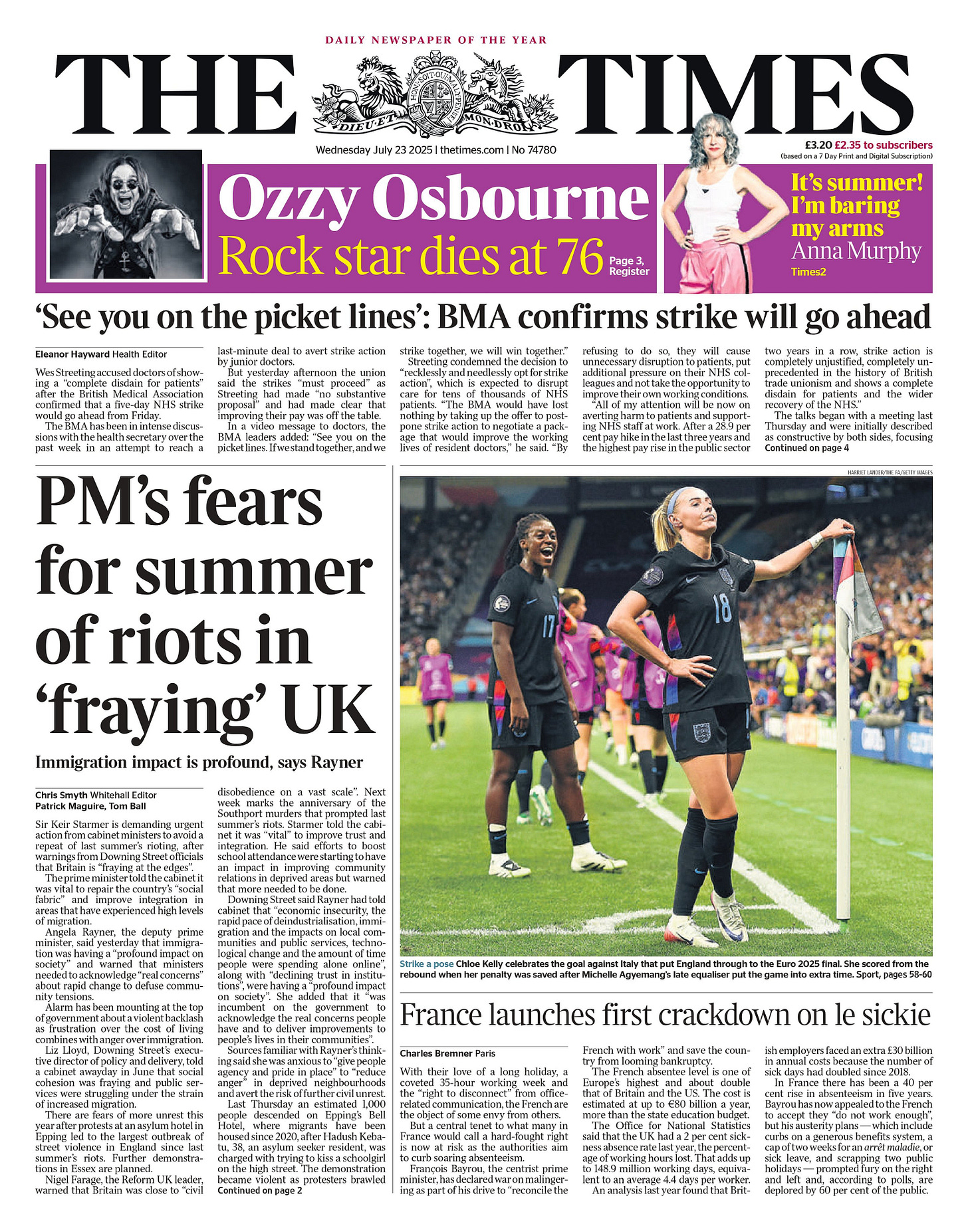

What are all you journalists smoking or are you all in putins pocket. An independent anti corruption body in ukraine? And who they supposed to answer to? Well it should be to the elected government which at this time is Zelenski. Its ridiculous to think they answer to no one. Or is russia paying them and thier bills, then i can understand why they dont want to answer to their own government.